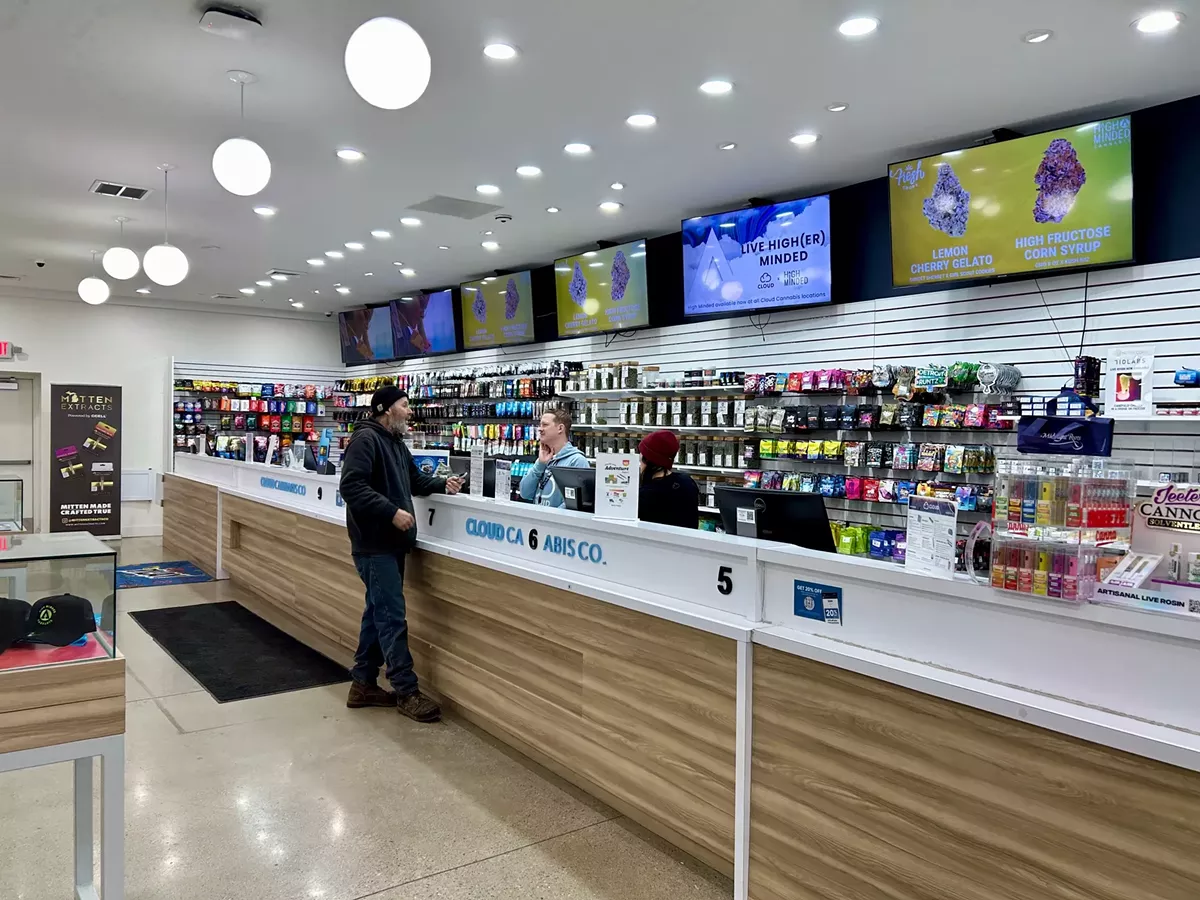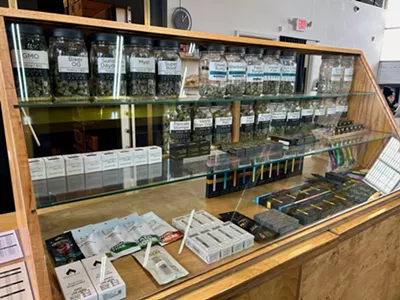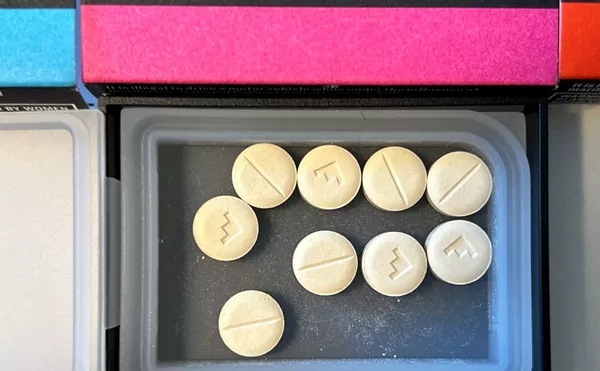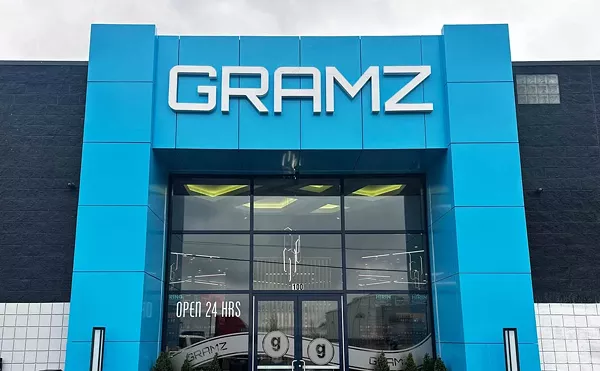Local entrepreneurs roll out crypto fix for cash-only cannabis dispensaries
$5 ATM transaction fees are a costly and inconvenient feature in an industry that doesn’t take credit cards. Could cryptocurrency be the solution?


Audio By Carbonatix
[
{
"name": "GPT - Leaderboard - Inline - Content",
"component": "35519556",
"insertPoint": "5th",
"startingPoint": "3",
"requiredCountToDisplay": "3",
"maxInsertions": 100,
"adList": [
{
"adPreset": "LeaderboardInline"
}
]
}
]
Welcome to The Straight Dope, a weekly series that explores the cannabis industry in Michigan.
ATM fees at dispensaries are a buzzkill.
A vast majority of cannabis retailers won’t take debit or credit cards because marijuana is still illegal on the federal level, leaving customers with no choice but to pay in cash. Since many of us don’t carry cash anymore, we often resort to withdrawing money from the in-store ATM, which charges up to $5 for a transaction. So let’s say you’re spending $20 on some flower or a few prerolls, the total cost just rose to $25. And you’re already paying 16% in state excise and sales taxes, and Gov. Gretchen Whitmer wants to raise them to 38%.
At a time when cashless transactions are the norm, there has to be a better way, right?
Two innovative college buddies from metro Detroit are confident they have a better solution. Jonah, 22, and Benjamin, 20, founded Coinnect LLC, a start-up that wants to help dispensaries bypass the need for cash by using cryptocurrency. They asked that we withhold their last names because of highly publicized attacks, including kidnappings, on crypto innovators.
The idea behind Coinnect is to allow dispensaries to accept cryptocurrency payments seamlessly, while keeping the process simple for businesses and customers unfamiliar with the technical side of blockchain.
“Our system makes it easy for businesses to accept crypto without even understanding crypto,” Jonah tells me. “We thought of everything and made it as user friendly as possible. We think this is going to be very common in dispensaries because of the regulations they face in the industry.”
Using Coinnect is as easy as scanning a QR code. When a customer checks out, the dispensary enters the total into Coinnect’s system, which generates an invoice for the retailer and the customer. If the customer already has a digital crypto wallet, they just scan a QR code, send the payment, and the transaction is approved within seconds at a tiny fraction of the cost of an ATM fee.
For those without a crypto wallet, Coinnect allows the customer to scan the QR code to purchase digital tokens using a credit card and then enter their payment details on a secure webpage to complete the transaction. The system saves the customers’ information, so future purchases are even faster.
Coinnect also enables direct bank transfers secured by Plaid, a financial technology company that connects bank accounts to apps and services.
“It’s very seamless, and it’s meant to be as easy as possible,” Jonah says of Coinnect. “We handle all of the logistics.”
The system runs on Polygon, a fast and low-cost blockchain network, and integrates with Uniswap to instantly convert customer payments into USDC, a stablecoin pegged to the U.S. dollar. That means dispensaries can receive digital dollars instead of volatile cryptocurrencies like Bitcoin.
“If you have a crypto wallet, our system runs on Polygon. It’s super fast,” Jonah explains. “The transaction is confirmed immediately.”
Coinnect is also working on a mobile app that will allow customers to tap-to-pay with crypto, similar to Apple Pay, but with lower transaction fees.
The system is also designed to safeguard users. Unlike some payment processors, Coinnect doesn’t hold or access crypto keys. Instead, transactions go directly between you and the dispensary, keeping your funds secure and in your control, Jonah says.
Jonah believes this could be the future of dispensary transactions, especially since younger generations are more reliant on digital wallets.
“We’re not trying to make money in the short term,” Jonah says. “We’re trying to scale this business and give customers the best experience possible. We think this can help a lot of dispensaries. This could be really big.”
The platform is currently in its beta phase, and Jonah says multiple dispensaries are interested in testing it.
Since recreational cannabis sales began in Michigan in December 2019, most dispensaries have relied on cash transactions because federal law still classifies marijuana as an illegal drug. That means major banks and credit card companies won’t process payments for dispensaries because they’re afraid of penalties for handling money tied to what’s technically an illegal industry under federal banking regulations.
Without access to traditional financial services, dispensaries are left with few options. For most, cash remains the only viable way to do business, leaving customers with the inconvenience of in-store ATMs and their steep fees.
And it’s no small issue. Michigan’s cannabis industry generated more than $3 billion in sales last year, and the vast majority of those transactions were made in cash. That’s a massive amount of dough.
Handling large piles of cash creates risks for businesses, from theft to accounting challenges, and it’s also a pain in the ass for those of us who are fleeced at the ATM because we don’t carry cash like it’s the 20th century.
You can follow Coinnect on Instagram.
If you want us to sample your cannabis products, send us an email at steve@metrotimes.com.






